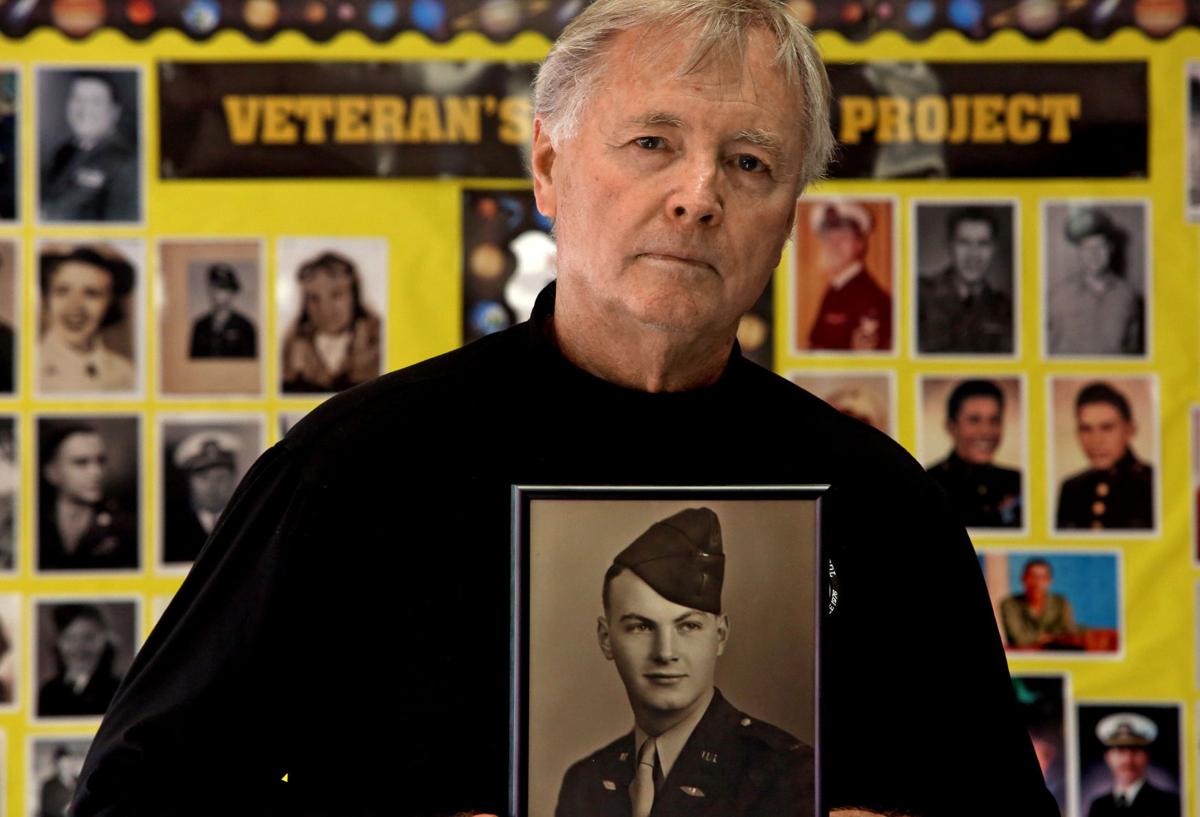This story is one part of a series about local veterans in honor of Veterans Day. Read the full story here.
______________________________________________________________
University High School teacher Don Dickinson has been involved in the Veterans Heritage Project since the start of the 2013-2014 school year.
Students meet in class and as a lunchtime club to honor veterans, capture their stories and give them the respect they deserve.
The project closely mirrors, but is not part of the Veterans History Project associated with the Library of Congress, which also collects and preserves the personal accounts of veterans.
“What I am trying to do here is to work with my students to be historians,” Dickinson said adding, “In particular, I want them to preserve the oral history of our veterans who probably won’t be here in a few years.”
Veterans are interviewed in class, where they are videotaped as they reflect on their military experiences. The project allows students to learn history directly from them and maybe have a better understanding of our military in times of war and peace.
Dickinson, 73, said veterans are videotaped and the transcripts are turned into stories and made into a book that is then given to the veterans.
The videos are then forwarded to the Library of Congress for their archives to preserve the oral and written history of veterans in military conflicts, Dickinson said.
“It is a really popular class,” Dickinson said. Even though the class is limited to only 32 students, some 190 students signed up for it. The club has 50 additional students that meet every other week at lunch, he said.
“I feel as a teacher, I am opening a door to an important part of my students’ heritage,” Dickinson said.
In addition to developing their writing skills, there is also an opportunity to perfect their communication skills. They not only talk to veterans, they have to speak in front of their classmates, some of whom will also be selected to talk in front of the whole school during their end-of-the-year assembly.
Junior Tatum Boldt, 16, and senior Ryan Sheets, 18, are two students taking the class.
“I’ve wanted to take this class since I first heard about it,” Boldt said. “I come from a military family.”
Her grandfather served during the Vietnam era, she said. “He’s been telling me about his military experiences as far as I can remember.”
“It’s really important to learn from our past so we can prepare for our future,” Boldt said.
The focus of the class is on military history, and it is good to comprehend American history in its entirety, she said.
The veterans want us to learn from them but also, “to be able to have respect and be grateful for what they have done for our country and for us,” she said.
Sheets added that most history classes teach about the “what’s” of history as in “what” happened.
In class you learn how it affected people — that’s where history really comes to life, he said.
Their personal details are foreign, hard to imagine. They are from a different time and a different world but their stories become real, Sheets said.
“I have gained so much respect for the men and women who have served and their sacrifices they had to make.”
A veteran reminded Sheets that he is free and not to waste the gift of freedom. “I think about that a lot. I think about the opportunities both daily and those down the road.”
Instructor Dickinson said the class gives his students empathy and provides a reality check to keep their own problems in perspective.
But there is also a personal element to all of Dickinson’s efforts. For him, he is passionate about the project because of a man he never met.
His father, 2nd Lt. James Franklin Dickinson, was a reservist who was attached to Patton’s Third Army. He was riding in a lightly armored vehicle on a reconnaissance mission when he was killed in Braunau am Inn, Austria, Adolf Hitler’s birthplace, in the last days of the war.
“My father was killed May 4, 1945, the day before the Germans surrendered in Austria,” said Dickinson,
Four days later it was May 8, 1945, V-E day, and end of the war in Europe.
Years later, he came across memorabilia that his grandmother had collected on his father and that family members had kept.
“My grandmother had saved all my father’s report cards, sports clippings, photos and letters,” he said.
“I spent almost a year putting all that together. That’s when I got to know my father … at age 50.”
His mother remarried, and his stepfather, Robert Anderson, was an Army pilot who flew in the Pacific who was called back for the Korean War but was killed during a night training mission.
His second stepfather, Robert Paine, was captured during the Battle of the Bulge and held as a prisoner of war. “I remember growing up he had PTSD (post-traumatic stress disorder). But he was the one who raised us. He stepped up and helped put our family together.”
“This project, for me personally, is about honoring all my fathers.”
Veterans have expressed concern to Dickinson, feeling today’s youth are not patriotic.
“If they are perceived as such,” Dickinson said, “it’s not their fault.
“Once they learn of the sacrifice, they become the veteran’s advocate and they feel the sense of sacrifice. It is personal, it’s human and they become patriotic.”





